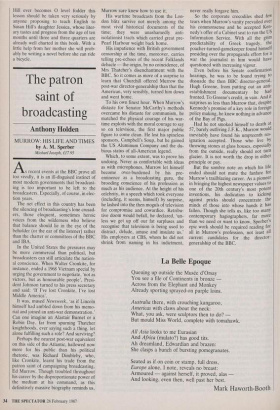The patron saint of broadcasting
Anthony Holden
MURROW: HIS LIFE AND TIMES by A. M. Sperber
Michael Joseph, (17.95
As recent events at the BBC prove all too vividly, it is an ill-disguised instinct of most modern governments that broadcast- ing is too important to be left to the broadcasters. Especially, of course, in elec- tion years.
The net effect in this country has been the silencing of broadcasting's lone crusad- ers, those eloquent, sometimes heroic voices from the wilderness who believe that balance should lie in the eye of the beholder (or the ear of the listener) rather than the charter or committees of the BBC and IBA.
In the United States the pressures may be more commercial than political, but broadcasters can still articulate the nation- al conscience. When Walter Cronkite, for instance, ended a 1968 Vietnam special by urging the government to negotiate, 'not as victors, but as honourable people', Presi- dent Johnson turned to his press secretary and said: 'If I've lost Cronkite, I've lost Middle America'.
It was, mused Newsweek, 'as if Lincoln himself had ambled down from his memo- rial and joined an anti-war demonstration.' Can one imagine an Alastair Burnet or a Robin Day, far from spurning Thatcher knighthoods, ever saying such a thing, let alone fulfilling such a role? And surviving?
Perhaps the nearest post-war equivalent on this side of the Atlantic, hallowed now more for his public than his political rhetoric, was Richard Dimbleby, who, like Cronkite, learnt his trade from the patron saint of campaigning broadcasting, Ed Murrow. Though troubled throughout his career by the disproportionate power of the medium at his command, as this definitively massive biography reminds us, Murrow sure knew how to use it.
His wartime broadcasts from the Lon- don blitz survive not merely among the most vivid historical documents of the time; they were unashamedly anti- isolationist tracts which carried great pre- Pearl Harbour weight back home.
His impatience with British government censorship at the time, moreover, carries telling pre-echoes of the recent Falklands debacle — the origin, by no coincidence, of Mrs Thatcher's disenchantment with the BBC. So it comes as more of a surprise to learn that Churchill offered Murrow the post-war director-generalship than that the American, very sensibly, turned him down and went home.
To his own finest hour. When Murrow's distaste for Senator McCarthy's methods overcame his distaste for communism, he matched the physical courage of his war- time exploits with the moral courage to say so on television, the first major public figure to come clean. He lost his spineless sponsors, Campbell's Soup, but he gained the US Aluminum Company and the du- bious status of all-American legend.
Which, to some extent, was to prove his undoing. Never as comfortable with ideas as with microphones, Murrow let himself become over-burdened by his pre- eminence as a broadcasting guru, the brooding conscience of his profession as much as his audience. At the height of his celebrity, in a speech which took everyone (including, it seems, himself) by surprise, he lashed into the then moguls of television for compromise and cowardice. Retribu- tive doom would befall, he declared, 'un- less we get up off our fat surpluses and recognise that television is being used to distract, delude, amuse and insulate us.' His employers at CBS, whom he did not shrink from naming in his indictment, never really forgave him. So the corporate crocodiles shed few tears when Murrow's vanity prevailed over his commonsense and he accepted Ken- nedy's offer of a Cabinet seat to run the US Information Service. With all the grim predictability of Greek tragedy, the poacher-turned-gamekeeper found himself presiding over the propaganda effort for a war the journalist in him would have questioned with increasing vigour. Even before his Senate confirmation hearings, he was to be found trying to dissuade the then BBC director-general, Hugh Greene, from putting out an anti- establishment documentary he had fronted. To Greene's credit, in vain. And it surprises us less than Murrow that, despite Kennedy's promise of a key role in foreign policy making, he knew nothing in advance of the Bay of Pigs. Had he not smoked himself to death at 57, barely outliving J.F.K., Murrow would inevitably have found his umpteenth res- ignation accepted. Those who live by throwing stones at glass houses, especially from the outside, really should not turn glazier. It is not worth the drop in either .principle or pay. But the sombre note on which his life ended should not mute the fanfare for Murrow's trailblazing career. As a pioneer in bringing the highest newspaper values to one of the 20th century's most potent inventions, his dedication to kicking against pricks should concentrate the minds of those into whose hands it has fallen. Though she tells us, like too many contemporary hagiographers, far more than we need or want to know, Sperber's epic work should be required reading for all in Murrow's profession, not least all current candidates for the director- generalship of the BBC.


















































 Previous page
Previous page